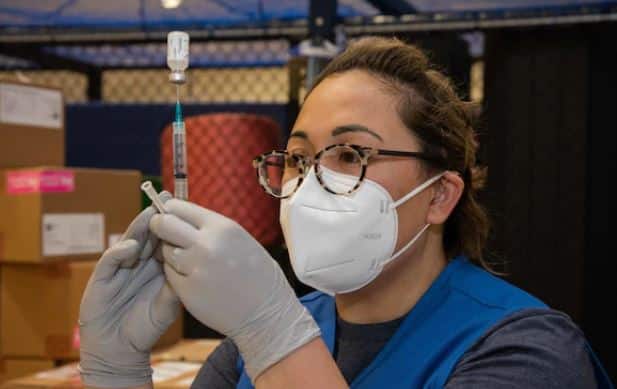U.S. Military Expands Production of ‘Low-Dead Space’ Syringes

The Pentagon signed an agreement to expand the production of more efficient syringes, which it announced on Monday, as part of the country’s national response to coronavirus.
According to the agreement, the U.S. allocated $27.3 million in government funding to Retractable Technologies, Inc., a manufacturer that has previously received government contracts to keep up with demand for needles because of the coronavirus outbreak.
With that funding, Retractable will install two new automated assembly lines at its manufacturing facility based in Little Elm, Texas, the U.S. Department of Defense said.
The addition of these two assembly lines will expand the U.S.’s capacity to produce “low-dead” space syringes by 75%, according to a written comment from the DOD.
Low-dead space safety syringes are designed to lower the amount of “dead” or empty space between the syringe and the needle, allowing for more doses of a vaccine by preventing inaccurate dosing and waste.
The U.S. Food and Drug Administration updated the authorization for Pfizer-BioNTech’s COVID-19 vaccine in January to allow physicians to extract six doses per vial rather than five, after they discovered that low-dead space syringes prevented enough waste to get another dose out of the vials, according to reporting from Physician’s Weekly.
The Pentagon has said that using LDS syringes will allow access to 20% more coronavirus vaccine doses than non-LDS syringes.
The effort is part of the department’s attempt to both increase the availability of vaccines and the willingness of military personnel to get the vaccine.
A memo from last week reaffirmed the Pentagon’s support for initiatives to increase vaccination acceptance among all service members.
That memo described coronavirus as “the greatest proximate challenge to our nation’s security,” and says that the department is moving to a “new phase” of its efforts now that it has an available supply of vaccines.
The memo instructs commanders that the vaccine is available to “all eligible beneficiaries,” and it outlines a plan for an “aggressive effort to inform and educate” about the vaccine.
It also suggests that leaders offer incentives to get the vaccine and asks them to hold “nonjudgmental” conversations to acknowledge the concerns of those who are hesitant about vaccines.
“These conversations are not easy,” reads the memo, “they may not be short, and they may require multiple touchpoints, but they are critically important.”
“We know from our experience within the department that use of this approach works, and encourage its widespread adoption,” the DOD said.
All defense personnel became eligible to receive the coronavirus vaccine earlier this year. Reporting from April suggested that nearly a third, and in some cases perhaps more, of military personnel had opted out of getting the vaccine and there was even a question circulating about whether coronavirus vaccination should be made mandatory for the military.
Military officials told reporters that the declinations of the vaccine came mostly from young and healthy service members who did not feel they needed a vaccine. Receiving a vaccine remains voluntary for service persons, according to the latest memo.
However, vaccination rates in the military have increased since then as the military and some individual bases have looked to incentivize opting-in to the vaccine.
According to the latest data from the Centers for Disease Control, the DOD has administered 3,517,706 coronavirus vaccine doses.























